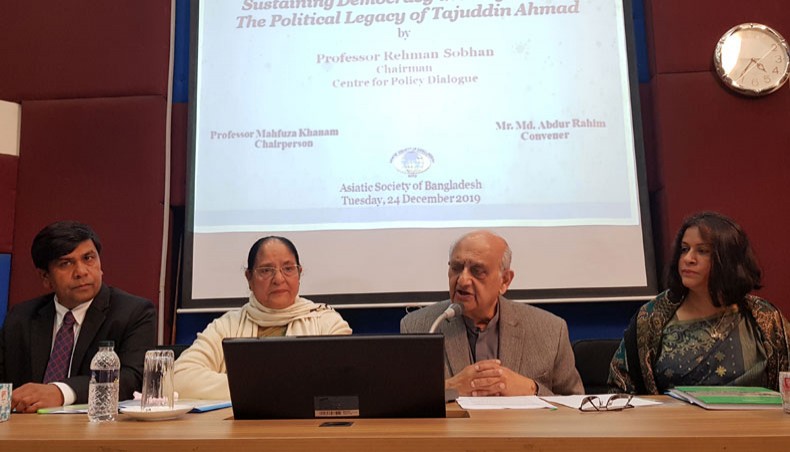
CPD chairman Rehman Sohban delivers Tajuddin Ahmad Memorial Trust Fund Lecture on ‘sustainable democracy in Bangladesh: the political legacy of Tajuddin Ahmad’ at the Asiatic Society of Bangladesh in Dhaka on Tuesday. — New Age photo
Centre for Policy Dialogue chairman Rehman Sobhan said Tuesday that it was essential to ensure that the executive branch remained fully accountable to Parliament and its members to their electorate.
‘In such a parliament the opposition must be treated as an integral part of the governance process and provided with space to represent the concerns of their electorate and to hold the government accountable for all their acts of omission and commission,’ he said in his lecture, ‘Sustaining Democracy in Bangladesh: the Political Legacy of Tajuddin Ahmad’ at the Asiatic Society of Bangladesh auditorium in the capital.
The Tajuddin Ahmad Memorial Trust Fund organised the Tajuddin Ahmad Memorial Trust Fund Lecture 2019 in association with the Asiatic Society of Bangladesh.
‘Parliament is, however, only one pillar of the democratic process. We would need to restore freedom to the media, not just by permitting a proliferation of outlets but by providing them with freedom to express themselves on all issue without fear of intimidation, legal harassment or incarceration,’ he said.
He also said that the civil society organizations should be strengthened and encouraged to express themselves on public issues again without fear of harassment or abuse.
‘In all such exercises of democratic expression, appropriate restraints need to be exercised by the media and the civil society who will need to function within the limits of the law,’ he said.
‘However, if the law is to be the ultimate arbiter of what is free or fair then, above all, we must restore faith in the rule of law through a strong independent and accountable judiciary which functions without fear or favour between those seeking the protection of the law,’ he added.
A democratic political order cannot be constructed and sustained without a democratic economic order, he said.
‘Both Bangabandhu and Tajuddin repeatedly advocated and fought for such an order. In their time they called it socialism. Today, we may look beyond the title and apply our minds to the process and end product of an economic order which democratizes opportunity and is built upon justice,’ professor Rehman said.
He called for democratization of access to wealth in the form of credit and productive assets.
He also called for democratization of access to quality health and education as well as access to the market so that small farmers, traders, entrepreneurs can come together to share the value addition process.
He also asked for providing the opportunities to the workers to become equity owner in their places of work and democratization of political participation and governance.
He said that return of the Aawami League to power in January 2009 through a massive electoral victory provided the last opportunity for power to change hands through a competitive election under a non-party caretaker government.
‘Under this elected parliament the winner-take all culture was further strengthened thereby enhancing the risks and the costs of electoral defeat,’ he said, adding that the l5th constitutional amendment passed in June 2011 which repealed the provision of national elections under a caretaker government was the inevitable outcome of the progressive depreciation of the democratic process.
In contrast, the record of the incumbent regime, particularly on the economic front, has been quite promising and compares well with other developing countries including our neighbours, he said.
‘There was, thus, every possibility that the regime could be returned to power through a free and fair election though with a stronger opposition represented in Parliament,’ he said, adding that surprisingly the regime decided that such generosity was too much of a political risk and opted for an election with a more predictable outcome.
‘An enfeebled opposition was powerless to resist such a process so that the current Sangshad once again has a negligible opposition,’ he said.
In an opposition free political landscape where the government is exposed to little accountability the quality of governance tends to deteriorate, he said.
‘A free media and strong civil society could partially compensate for a weak political opposition. But a regime which remains uncomfortable about facing political contestation is tempted to narrow all other areas of challenge,’ he said.
He said that both the media and the civil society could normally expect to seek protection from a strong, independent judiciary. But here again the judiciary has largely been disinclined to challenge the political authority of the government.
The lecture over, Rehman Sobhan described the country’s founding prime minister Tajuddin as the unsung hero of Bangladesh.
Chaired by Asiatic Society of Bangladesh chairperson Mahfuza Khanam, Dr Kamal Hossain and M Amir-ul Islam, Tajuddin Ahmed’s daughters Sharmin Ahmad and Simeen Hussain Rimi spoke among others.

